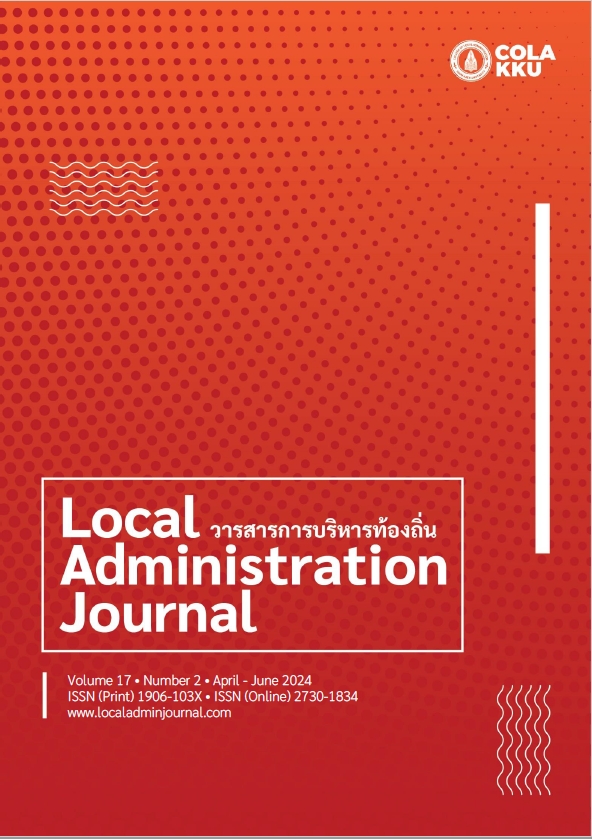ศักยภาพในการดำเนินธุรกิจที่เป็นมิตร กับสิ่งแวดล้อมของผู้ประกอบการ ร้านกาแฟในประเทศไทย
คำสำคัญ:
ร้านกาแฟที่เป็นมิตรกับสิ่งแวดล้อม, ธุรกิจที่เป็นมิตรกับสิ่งแวดล้อมบทคัดย่อ
การศึกษานี้มีวัตถุประสงค์เพื่อวิเคราะห์ศักยภาพและข้อจำกัดของผู้ประกอบการในการดำเนินธุรกิจร้านกาแฟที่เป็นมิตรกับสิ่งแวดล้อม และเสนอแนวทางส่งเสริมการดำเนินธุรกิจร้านกาแฟที่เป็นมิตรกับสิ่งแวดล้อมในมิติการผลิตและการบริการ ผู้วิจัยเก็บข้อมูลแบบสอบถามกับผู้ประกอบการร้านกาแฟ ในพื้นที่ท่องเที่ยว จำนวน 272 ราย โดยสุ่มตัวอย่างแบบบังเอิญและสัมภาษณ์ผู้ประกอบการที่มีความสนใจในการดำเนินธุรกิจที่เป็นมิตรกับสิ่งแวดล้อมจำนวน 15 ราย การวิเคราะห์ข้อมูลใช้การวิเคราะห์ข้อมูลสถิติเชิงพรรณนาร่วมกับการวิเคราะห์เชิงข้อมูลคุณภาพที่ได้จากการสัมภาษณ์ ผลการศึกษาพบว่า ผู้ประกอบการร้านกาแฟเกินกว่ากึ่งหนึ่งมีความคาดหวังในการดำเนินธุรกิจที่สนับสนุนกิจการที่ดำเนินการที่เป็นมิตรกับสิ่งแวดล้อม และสนับสนุนกิจการที่มีความรับผิดชอบต่อสังคมและสิ่งแวดล้อมที่ระดับเท่ากันร้อยละ 59.56 ผู้ประกอบการร้านกาแฟส่วนใหญ่มีพฤติกรรมในการซ่อมแซมเครื่องใช้ต่าง ๆ มากกว่าการซื้อใหม่ที่ร้อยละ 81.62 นอกจากนี้ยังพบว่า ผู้ประกอบการร้านกาแฟส่วนใหญ่มีแนวโน้มในการพัฒนาศักยภาพการดำเนินธุรกิจที่เป็นมิตรกับสิ่งแวดล้อมตั้งแต่การคัดแยกประเภทขยะจากของเสียร้อยละ 79.60 ผู้ประกอบการที่มีความสนใจในการดำเนินธุรกิจที่เป็นมิตรกับสิ่งแวดล้อม ให้ความสำคัญกับการพัฒนาศักยภาพตั้งแต่ต้นน้ำจนถึงปลายน้ำตั้งแต่การเลือกเมล็ดกาแฟที่ปลอดสารเคมี รวมถึงขั้นตอนการแปรรูปกาแฟที่ต้องไม่สร้างมลพิษต่อสิ่งแวดล้อม ไปจนถึงการจัดการขยะภายในร้าน ในขณะเดียวกัน ผู้ประกอบการก็เล็งเห็นข้อจำกัดร่วมกันจากการไม่มีมาตรการ หรือนโยบายสนับสนุนและส่งเสริมการดำเนินธุรกิจร้านกาแฟที่เป็นมิตรกับสิ่งแวดล้อมจากภาครัฐ อาทิ ข้อจำกัดในเรื่องราคาบรรจุภัณฑ์ที่เป็นมิตรกับสิ่งแวดล้อมที่มีราคาสูงกว่าบรรจุภัณฑ์พลาสติก การรณรงค์การบริโภคอย่างเป็นมิตรกับสิ่งแวดล้อมมียังน้อย การไม่มีการส่งเสริมการผลิตเมล็ดกาแฟที่ปลอดสารเคมี หรือการไม่มีการขับเคลื่อนกระแสสังคมสู่การบริโภคอย่างยั่งยืนและมีความรับผิดชอบต่อสังคม
เอกสารอ้างอิง
C Services GmbH. (2022). The 4C certification system. Retrieved from https://www.4c-services.org/ process/certification-scopes/
Busser, S., & Jungbluth, N. (2009). The Role of Flexible Packaging in the Life Cycle of Coffee and Butter. International Journal of Life Cycle Assessment, 14(14), S80–S91.
Centre for the Promotion of Imports from Developing Countries. (2021). The European Market Potential for Certified Coffee. Retrieved from https://www.cbi.eu/market-information /coffee/certified-coffee/market-potential
Centre for the Promotion of Imports from Developing Countries. (2021). The European Market Potential for Certified Coffee. Retrieved from https://www.cbi.eu/market-information/coffee/certified-coffee/market-potential
Coltro, L., Mourad, A. L., Oliveira, P., Baddini, J., & Kletecke, R. (2006). Environmental Profile of Brazilian Green Coffee. International Journal of Life Cycle Assessment, 11, 16–21.
De Monte, M., Padoano, E., & Pozzetto, D. (2005). Alternative Coffee Packaging: An analysis from a life cycle point of view. Journal of Food Engineering, 66, 405–411.
Department of Marine and Coastal Resources. (2023). Situation of marine garbage (2021). Retrieved from https://km.dmcr.go.th/c_260/d_19695 (in Thai)
Environmental Research Institute, Chulalongkorn University. (2019). Overview of measures to reduce single-use plastic waste abroad. Retrieved from https://ej.eric.chula.ac.th/article/view/151 (in Thai)
Environmental Research Institute, Chulalongkorn University. (2023). Coffee grounds: From coffee cups to circular economy concepts for biological products. Retrieved from https://ej.eric.chula.ac.th/article/view/66 (in Thai)
Fairtrade Labelling Organizations International. (2021). Coffee. Retrieved from https://www.fairtrade.net/product/coffee
Food Intelligence Center Thailand. (2019). Thailand food market report January 2019. Retrieved from https://fic.nfi.or.th/upload/market_overview/Rep_Cafe_15.01.62.pdf (in Thai)
Furfori, S., Portis, C., Cabilli, A., Vanii, A., Breedveld, L., & Barrale, R. (2012). LCA of One Cup of Espresso Coffee: How to Collect and Validate LCA Data along the Coffee Supply Chain. International Conference on Life Cycle Assessment in the Agri-Food Sector, 8.
Geibler, J. V., Cordaro, F., Kennedy, K., Lettenmeier, M., & Roche, B. (2016). Integrating Resource Efficiency in Business Strategies: A Mixed-Method Approach for Environmental Life Cycle Assessment in the Single-Serve Coffee Value Chain. Journal of Cleaner Production, 115, 62–74.
Hassard, H., Couch, M., Techa-Erawan, T., & McLellan, B. C. (2014). Product Carbon Footprint and Energy Analysis of Alternative Coffee Products in Japan. Journal of Cleaner Production, 73, 310–321.
Hellweg, S., & Milá i Canals, L. (2014). Emerging Approaches, Challenges and Opportunities. Life Cycle Assessment, 344, 1109–1113.
Hicks, A. L., & Halvorsen, H. (2019). Environmental Impact of Evolving Coffee Technologies. International Journal of Life Cycle Assessment, 24, 1396–1408.
Hoekstra, A. (2015). The Sustainability of a Single Activity, Production Process or Product. Ecological Indicators, 57, 82–84.
Humbert, S., Loerincik, Y., Rossi, V., Margni, M., & Jolliet, O. (2009). Life Cycle Assessment of Spray Dried Soluble Coffee and Comparison with Alternatives (drip filter and capsule espresso). Journal of Cleaner Production, 17, 1351–1358.
Jambeck, J. R., Geyer, R., Wilcox, C., Siegler, T. R., Perryman, M., Andrady, A., Narayan, R., & Law, K. L. (2015). Plastic Waste Inputs from Land into the Ocean. Science, 347(6223), 768-771.
Jeong, E., Jang, S. S., Day, J., & Ha, S. (2014). The Impact of Eco-Friendly Practices on Green Image and Customer Attitudes: An Investigation in a Café Setting. International Journal of Hospitality Management, 41, 10-20.
Jitrapirom, T., & Suksri, S. N. (2015). The Consumers’ Decision-Making Behavior to Select Freshly Brewed Coffee Shop Services in Amphoe Mueang, Suratthani Province. Journal of Management Sciences, 2(1), 115-131. (in Thai)
Ministry of Natural Resources and Environment. (2023). Pyrolysis technology: Changing plastic waste into oil helps reduce pollution and global warming. Retrieved from https://www.mnre.go.th/th/news/detail/121075 (in Thai)
Nestlé Group. (2003). AAA sustainable quality program. Retrieved from https://www.nespresso.com/ ncp/positive/th/th#!/sustainability/aaa-sustainable-quality
Office of Agricultural Economics. (2021). Situation of important agricultural products and trends in 2022. Retrieved from https://www.oae.go.th/assets/portals/1/files/journal/2565/ trendstat2565-Final-Download.pdf (in Thai)
Office of Agricultural Economics. (2022). Coffee: Perennial space, fruitful area, yield, and yield per rai including countries and regions, and by province in 2021. Retrieved from https://www.oae.go.th/assets/portals/1/fileups/prcaidata/files/coffee%2064(2).pdf (in Thai)
Udomthanasansakul, P. (2021). The Relationship between Corporate Social Responsibility, Corporate Reputation and Competitive Advantage Factors of Small and Medium Enterprises. Journal of the University of the Thai Chamber of Commerce in Humanities and Social Sciences, 41(4), 44-60. (in Thai)
Pollution Control Department. (2022). Thailand state of pollution report 2021. Retrieved from https://www.pcd.go.th/publication/26626 (in Thai)
Rainforest Alliance. (2020). UTZ certification (Now part of the Rainforest Alliance). Retrieved from https://www.rainforest-alliance.org/utz/
Rainforest Alliance. (2021). What does “Rainforest Alliance certified” mean?. Retrieved from https://www.rainforest-alliance.org/insights/what-does-rainforest-alliance-certified-mean/
SCS Global Services. (2022). Starbucks C.A.F.E. practices. Retrieved from https://www.scsglobalservices.com/services/starbucks-cafe-practices
TGO Climate Action Academy. (2020). Sustainable consumption and production … Mission to save the world. Retrieved from https://caacademy.tgo.or.th/การบริโภคและการผลิตอย่/ (in Thai)
Saengmaneedech, T. (2024). Applying the Circular Economy to Gain Trade Advantages in Fashion Recycling Business. Journal of Administrative and Management Innovation, 12(1), 1-15. (in Thai)
U.S. Department of Agriculture. (2004). USDA organic. Retrieved from https://www.usda.gov/topics /organic
United Nations Environment Programme. (2020). Goal 12: Sustainable consumption and production. Retrieved from https://www.unep.org/explore-topics/sustainable-development-goals/why-do-sustainable-development-goals-matter/goal-12
World Economic Forum. (2020). White paper: Plastics, the circular economy and global trade. Retrieved from https://www3.weforum.org/docs/WEF_Plastics_the_Circular_Economy_ and_Global_Trade_2020.pdf
ดาวน์โหลด
เผยแพร่แล้ว
รูปแบบการอ้างอิง
ฉบับ
ประเภทบทความ
สัญญาอนุญาต
ลิขสิทธิ์ (c) 2024 วารสารการบริหารท้องถิ่น

อนุญาตภายใต้เงื่อนไข Creative Commons Attribution-NonCommercial-NoDerivatives 4.0 International License.
บทความทุกเรื่องที่ได้รับการตีพิมพ์ทั้งรูปเล่มและบทความออนไลน์ เป็นลิขสิทธิ์ของวิทยาลัยการปกครองท้องถิ่น มหาวิทยาลัยขอนแก่น



